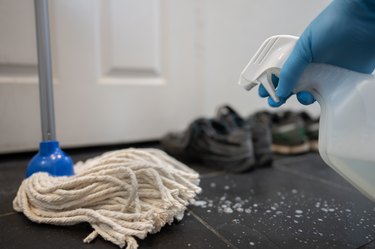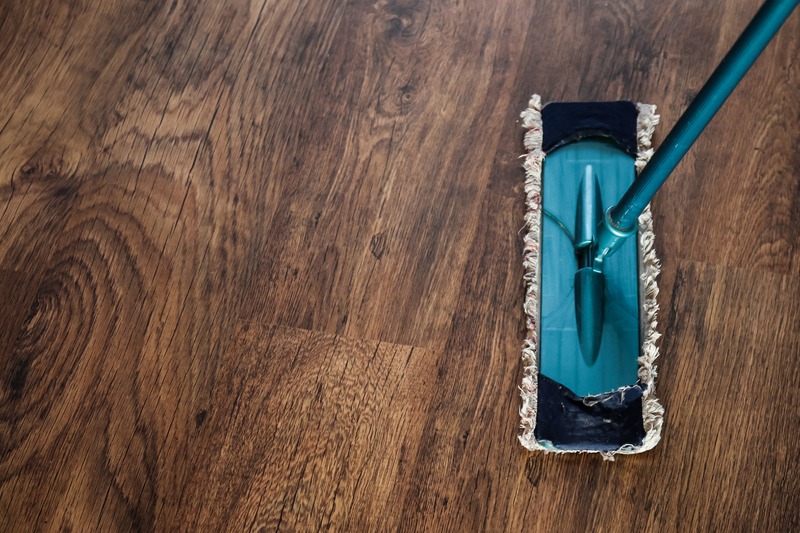Have you ever wondered if bleach is the ultimate cleaning weapon for those stubborn stains on your floor tiles? It’s tempting, isn’t it? After all, bleach is known for its powerful germ-killing capabilities and its ability to brighten surfaces.

Image: www.ehow.com
But before you grab that bleach bottle and start scrubbing, hold on! Using bleach on floor tiles isn’t always the best idea. While it might seem like a quick fix, there are some potential downsides to consider, and its effectiveness depends heavily on the type of tile you have.
Understanding Floor Tile Materials
The first step in deciding whether to use bleach on your floor tiles is to understand the different materials they are made of. Common types include:
Ceramic Tile
Ceramic tiles are a popular choice for flooring due to their durability, moisture resistance, and affordability. They are generally safe to clean with bleach, but using it too often can dull the glaze over time.
Porcelain Tile
Porcelain is a type of ceramic tile known for its superior hardness and density. It’s also generally safe to clean with bleach, but again, keep in mind that overuse can affect its shine.

Image: www.cafloordesign.com
Natural Stone Tiles
Natural stone tiles, like marble, granite, limestone, and slate, add elegance and sophistication to any home. However, they are more porous than ceramic or porcelain tiles, making them more susceptible to damage from bleach. The strong chemicals in bleach can etch the surface of these stones, leaving behind dull spots or even discoloration.
Vinyl Tiles
Vinyl tiles are a budget-friendly option offering flexibility and water resistance. However, bleach can harm the vinyl’s surface, leading to discoloration, cracking, or even causing the sealant to wear off.
Laminate Flooring
Laminate flooring simulates the appearance of hardwood but is made of composite materials. Bleach is a big no-no for laminate flooring. It will damage the decorative layer, causing the surface to look faded or even peel.
Bleach: A Double-Edged Sword
Bleach is a powerful disinfectant, effectively killing bacteria and viruses on surfaces. But its strength can also be a drawback. Here’s a breakdown of the pros and cons of using bleach on floor tiles:
Pros:
- Effective disinfection: Bleach eliminates bacteria, viruses, and mold spores, making it ideal for cleaning areas prone to contamination.
- Whitening power: Bleach can remove stains and brighten grout, giving your floor a fresh look.
Cons:
- Damage to tiles: As mentioned earlier, bleach can damage certain types of tiles, especially natural stone. It can weaken the sealant, lead to discoloration, and even etch the surface.
- Harmful to surfaces: Bleach is corrosive and can damage grout, causing it to become brittle and prone to cracking.
- Health risks: Bleach fumes can be harmful to your respiratory system, particularly for individuals with asthma or other respiratory conditions. Always ensure adequate ventilation when using bleach.
- Environmental impact: Bleach is a harsh chemical that can pollute waterways and harm wildlife.
Alternatives to Bleach:
There are many effective cleaning solutions that are gentle on your tiles and the environment. Here are some alternatives to bleach:
- Baking soda: A natural abrasive and deodorizer, baking soda can lift stains and neutralize odors without damaging tiles.
- White vinegar: An excellent cleaning agent, vinegar can dissolve grime, kill bacteria, and leave your floors sparkling clean. Dilute it in water for a safe and effective solution.
- Hydrogen peroxide: Hydrogen peroxide is a safe and natural bleaching agent that can remove stains without harming most tiles.
- Commercial tile cleaners: Look for cleaning solutions specifically designed for floor tile materials. These cleaners are typically formulated to be safe and effective.
Safe and Effective Cleaning Practices:
To ensure your tile floors are clean and stay in good condition, here are some tips for safe and effective cleaning:
- Read the manufacturer’s instructions: Always follow the cleaning guidelines provided by the tile manufacturer. They know the best practices for maintaining the specific type of tile.
- Test in an inconspicuous area: Before using any new cleaning product, test it on a small, inconspicuous area of your floor to ensure it doesn’t damage the surface.
- Regular cleaning: Regular cleaning with a mild detergent is the best way to prevent dirt and grime from accumulating.
- Proper ventilation: If using any cleaning products that produce fumes, ensure adequate ventilation to prevent breathing in harmful chemicals.
- Avoid harsh scrubbing: Use a soft-bristled brush or microfiber mop to avoid scratching the tile surface.
- Dry thoroughly: After cleaning, thoroughly dry your floor to prevent watermarks and mold growth.
Can You Use Bleach On Floor Tiles
The Verdict:
While bleach can be useful for disinfecting some tile types, it’s important to use it with caution. Consider the type of tile you have, the potential risks to your tiles and health, and the availability of safer alternatives.
Remember, a consistent cleaning routine with gentle cleaners is the best way to keep your floor tiles looking their best and ensuring a healthy environment for your home.





